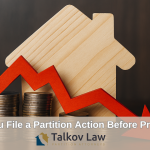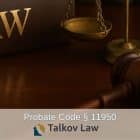
Talkov Law Partition Attorneys
11622 El Camino Real Ste 100
San Diego, CA 92130
San Diego’s coastal beauty, booming tech corridors, and upscale communities make it home to some of California’s most desirable real estate. From luxury condos in La Jolla to historic homes in North Park and investment properties in Mission Valley, co-ownership disputes often arise over high-equity real estate.
When co-owners can’t agree on how to manage, use, or sell the property, a partition action provides a legal path to protect your financial interests.
At Talkov Law Partition Attorneys, we focus exclusively on partition actions, representing clients throughout San Diego in disputes involving family members, investors, and business partners. Whether the property is a vacation rental, inherited estate, or jointly owned investment, our attorneys have the experience to pursue the most favorable outcome.
Why Choose Talkov Law as Your San Diego Partition Lawyer?

California’s Largest Partition Law Firm

Over 500 Partition Actions Successfully Resolved

Local Expertise in San Diego Real Estate

Hundreds of Millions in Real Estate Sold or Refinanced

Availability for Free Consultations

Strategic Legal Solutions for San Diego’s High-Value Properties
Contact Talkov Law For Help
Contact Talkov Law Partition Attorneys today for a free consultation and let California’s largest and most trusted partition law firm guide you to a successful resolution.
What Types of Partition Cases Do You Handle?
At Talkov Law, we handle a wide range of partition actions in San Diego, each with its own legal and financial complexities. Our attorneys focus exclusively on partition law, allowing us to tailor strategies based on the unique circumstances of each case, including:
Inherited Properties
When heirs can’t agree on whether to keep or sell inherited real estate, a partition action offers a clear legal remedy. We guide families through the process with sensitivity and a strong focus on protecting each client’s financial interests.
Commercial Properties
Co-owned commercial buildings—including retail storefronts in the Gaslamp District, office space in University City, and industrial units in Otay Mesa—often involve shared income, expenses, and long-term leases. We help resolve disputes efficiently while preserving property value.
Intra-Family Disputes
Family members who co-own real estate—such as siblings, parents and children, or extended relatives—often face disagreements over management, use, or sale. Our attorneys are experienced in resolving these sensitive cases through litigation or settlement.
Multi-Property Partitions
When co-owners share multiple properties, dividing everything fairly can be a logistical and legal challenge. We consolidate multi-property partition cases into one action to streamline the process and maximize results.
Ex-Boyfriend / Ex-Girlfriend Disputes
Unmarried couples who purchased property together often don’t have the same legal protections as married spouses. When relationships end, partition actions help separate interests and determine what each party is owed.
High-Value Properties
In San Diego’s competitive real estate market, high-value homes and investment properties require strategic handling. From accurate valuation to complex reimbursement claims, we ensure your equity is fully protected.
Common Partition Disputes in San Diego
San Diego’s competitive real estate market, rising property values, and diverse co-ownership arrangements often lead to disputes among family members, investors, and former partners. Common partition cases in San Diego involve disagreements over inherited coastal homes, jointly owned vacation rentals, and investment properties in high-demand areas like La Jolla, North Park, and Chula Vista. Whether one co-owner refuses to sell, stops contributing to expenses, or tries to control the use of the property, partition actions provide a legal remedy to resolve these disputes and unlock the property’s value.
Why Co-Owners Seek Partition Actions in San Diego
- Family members inheriting property in areas like La Jolla or Del Cerro but disagreeing on whether to sell or hold the home
- Business partners co-owning multi-unit investments in neighborhoods like North Park or Mission Valley who no longer share the same financial goals
- Former couples with jointly owned homes in Carmel Valley or Pacific Beach who need to divide real estate after a breakup
- High-value properties in coastal or urban areas where one owner wants to sell but another refuses to cooperate
Under California Code of Civil Procedure § 872.210, any co-owner can file a partition action to force the sale or division of jointly owned real estate unless there’s a binding agreement that says otherwise. When co-owners can’t agree, a partition action is the legal tool to resolve the dispute and protect your financial interests.
How Partition Actions Work in San Diego
Partition actions in San Diego follow a legal process established by California law that allows a co-owner to force the sale or division of real estate when there’s no agreement on what to do with the property. The process begins by filing a complaint in San Diego County Superior Court, which outlines the parties’ ownership interests and asks the court to order a sale or division of the property.
Once the case is filed, all other co-owners must be formally served and given a chance to respond. If there’s no agreement to resolve the dispute early on, the court may appoint a neutral partition referee to oversee the sale of the property—often with the help of a licensed local real estate broker. In many cases, the court will order a partition by sale, meaning the property will be listed on the open market and sold, with the proceeds distributed according to each party’s ownership interest—adjusted for any reimbursements or credits.
Whether the property is a beachside duplex in Pacific Beach, an inherited family home in Clairemont, or a rental unit in Hillcrest, partition actions in San Diego aim to resolve co-ownership disputes efficiently while protecting each party’s financial rights. With the region’s high property values, having an experienced attorney to manage the process is critical to achieving the best outcome.
Steps in a San Diego Partition Action
Navigating a partition action on your own can be overwhelming, confusing, and full of legal pitfalls—but at Talkov Law, we guide you through every step of the process, handling the paperwork, court procedures, and negotiations so you don’t have to go it alone.
- We File the Case
Your partition action starts with our team filing a complaint in San Diego Superior Court to begin the legal process. - We Notify the Co-Owners
All co-owners are formally notified, so the case can legally move forward—even if someone tries to delay or ignore it. - We Handle Disputes or Push for Settlemen
If the other owners respond or fight the case, we handle it. Many cases settle through negotiation or mediation—saving time and money. - The Court Makes a Decision
If there’s no agreement, the court decides how the property will be divided—usually through a sale. - The Property Is Sold
A court-appointed referee lists and sells the property, often with a licensed real estate agent. We guide the process every step of the way. - You Get Paid
After resolving any claims or costs, the sale proceeds are divided fairly—and you receive your share.
Common Legal Challenges in San Diego Partition Cases
Partition cases in San Diego often involve high-value properties, coastal real estate, and emotionally charged co-ownership disputes. Whether the property is located in La Jolla, North Park, or Pacific Beach, common issues include disagreements over ownership shares, reimbursement claims, and delays caused by uncooperative co-owners. These legal and financial complexities make experienced representation essential to achieving a fair outcome.
Disputes Over Ownership Shares
Co-owners often disagree about who owns what percentage of the property, especially when there’s no clear written agreement or when financial contributions were unequal.
Reimbursement Claims
One party may claim reimbursement for mortgage payments, property taxes, or repairs—while others dispute those expenses or argue they were voluntary.
Ouster and Exclusive Use
It’s common in San Diego for one co-owner to live in the property while excluding the others, which can lead to claims for occupancy rent or allegations of wrongful ouster.
Inherited Property Complications
Family members inheriting high-value homes in neighborhoods like La Jolla, North Park, or Encinitas often disagree on whether to sell, rent, or keep the home—causing emotional and legal tension.
Investment Property Disputes
In multi-unit or rental properties, disagreements arise over rental income, tenant management, or property improvements. These cases often require forensic accounting and detailed financial analysis.
Lien and Debt Issues
Liens from unpaid taxes, mortgages, or judgments can complicate the sale and delay the distribution of proceeds—especially if one co-owner’s debt affects the entire property.
Delays Due to Uncooperative Co-Owners
Refusals to sign documents, respond to court filings, or participate in the sale can drag out the process and increase legal costs for everyone involved.
San Diegos’s competitive real estate market makes it critical for property owners to have legal representation that protects their financial stake in high-equity properties. A skilled San Diego partition lawyer ensures that the process is handled efficiently, disputes are resolved fairly, and the final sale price reflects the true value of the property.
Why You Need a San Diego Partition Lawyer Instead of Handling It Yourself
Partition actions may seem straightforward, but legal complexities in San Diego’s high-value real estate market make them risky to handle on your own. A simple mistake in filing, valuation, or negotiations can cost you:
- Time
- Money
- Your Fair Share of the Property Value
Partition Laws and Court Procedures Are Complex
Under California Code of Civil Procedure § 872.210, any co-owner can file for partition, but the legal process involves precise filings, court hearings, and negotiations. Without legal experience, you risk delays, undervaluation, or procedural errors that can derail your case.
Co-Owners May Try to Undermine Your Rights
Disagreements over title, valuation, and reimbursements often arise. Co-owners may:
- Challenge the sale or valuation to reduce their buyout cost
- Delay proceedings through legal objections
- Assert false or exaggerated claims for financial credits
Without an experienced San Diego partition lawyer, you could lose money or face unnecessary complications.
Maximizing Value in San Diego’s Competitive Market
San Diego properties—from coastal neighborhoods like La Jolla and Point Loma to suburban areas like Del Cerro and Mira Mesa—often have significant equity. A skilled attorney ensures:
- The property is accurately valued and sold at market price
- Any financial contributions are fairly credited
- Buyouts or settlements reflect your best financial outcome
What is a Partition Action in San Diego?
A partition action is a legal process used to resolve disputes between co-owners of real property who cannot agree on how to manage or divide the property.
This type of lawsuit is common when there are disagreements among co-owners, such as family members, business partners, or investors—about selling, using, or dividing a shared property.
Who Needs a Partition Action?
In San Diego, a partition action can be initiated by any co-owner of real property or personal property (such as shares in a business or other jointly owned assets) who has not waived their right to partition. Below are the key groups and situations where a partition action might be applicable:
Co-Owners of Real Property
Any person who owns property as a co-tenant has the right to bring a partition action. This includes:
- Joint Tenants: Co-owners with equal shares who acquired the property together and have rights of survivorship.
- Tenants in Common: Co-owners with potentially unequal shares and no rights of survivorship.
Heirs of Inherited Property
- If you’ve inherited a property with siblings or other family members, and you can’t agree on what to do with it—like whether to sell it or keep it—a partition action can help.
- This is common when families inherit a house or land but have different ideas about how to move forward.
Ex-Boyfriends / Ex-Girlfriends
- Couples who purchased property together but are not married may file a partition action if their relationship ends and they disagree about the property’s future.
Business Partners or Investors
- Business partners or investors who jointly own commercial properties, rental units, or land can use partition actions to divide or sell the property if they cannot agree on its management or sale.
Partition actions are a powerful legal tool for resolving disputes among co-owners of property. Whether you’re a co-owner facing disagreements with other heirs over inherited property, business partners who no longer see eye-to-eye, or an unmarried couple splitting up, a partition action can provide a fair solution.
By forcing the sale or division of the property, it ensures that everyone’s interests are addressed, even when parties cannot agree.
If you’re in a situation where co-ownership has become unmanageable, seeking help from an experienced partition attorney can guide you through the process and help protect your rights.
What are the Different Types of Partition Actions in Los Angeles?
In Los Angeles, partition actions are legal remedies that allow co-owners of property to resolve disputes by dividing or selling the property. The type of partition action pursued depends on the nature of the property and the co-owners’ circumstances.
Below are the three primary types of partition actions:
Partition by Sale
The property is sold, and the proceeds are divided among the co-owners based on their ownership shares. This is the most common option in Los Angeles, especially for urban properties like homes and commercial real estate, where physical division is impractical.
It ensures that each co-owner receives their fair share of the property’s value, even if there is disagreement about whether to sell. Courts often prefer partition by sale for high-value or luxury properties.
Partition in Kind
The property is physically divided among the co-owners. While more suitable for large, undeveloped land, this method is rare in Los Angeles due to small lot sizes, zoning restrictions, and the potential to decrease property value.
In cases where partition in kind is feasible, the court strives to ensure the division is fair and does not disadvantage any co-owner.
Partition by Appraisal
One co-owner buys out the others at a fair market value determined by an appraisal. This option is ideal when one party wants to retain full ownership, such as in family or business disputes.
It avoids the need for a public sale, saving time and reducing potential conflicts over pricing or timing. Partition by appraisal can be a faster and more private resolution when all parties agree.
Each type of partition action has its pros and cons, and the best option depends on the property and relationship between the co-owners. In San Diego—where property values are high and ownership situations can be complex—partition by sale is usually the most efficient and widely used method. An experienced San Diego partition attorney can evaluate your specific situation and guide you toward the option that best protects your financial interests.
How Much Does a Partition Action Cost in San Diego?
Partition actions in San Diego come with a range of expenses, including attorney fees, court costs, appraisals, and other legal services. On average, these cases cost around $20,000, though simpler cases may cost as little as $5,000, while complex disputes involving high-value properties or uncooperative co-owners can go higher.
Typically, the court will divide these costs among the co-owners based on their ownership percentages. However, in some cases, the judge may shift the cost burden if one party delays the process, files unreasonable objections, or contributes to the conflict. Working with an experienced San Diego partition lawyer can help keep costs manageable and ensure that your financial interests are protected throughout the process.
How Long Does a Partition Action Take in San Diego?
Partition actions in San Diego handled by Talkov Law are often resolved in an average of 7 months, sometimes faster when co-owners are open to negotiation and the case results in a buyout or agreed-upon sale. This timeline reflects the relative efficiency of partition disputes. However, the process can take longer depending if there are complexities and other relationship between co-owners, such as co-owned businesses, and financial arrangements unrelated to the co-owned property.
San Diego’s competitive real estate market—particularly in sought-after neighborhoods like Bankers Hill, Del Cerro, Point Loma, and Kensington—can introduce added complexity. Specialized appraisals, luxury marketing strategies, and legal issues like liens or zoning restrictions may lengthen the process. Additionally, if one co-owner is uncooperative or disputes arise over valuation or reimbursements, the court may require more time to resolve the case.
With the guidance of experienced San Diego partition attorneys, many cases can still move efficiently through the legal system, helping co-owners reach resolution and recover their share of the property’s value.
Local Representation Across San Diego’s Premier Communities

Talkov Law Partition Attorneys
11622 El Camino Real Ste 100
San Diego, CA 92130
Talkov Law Partition Attorneys serves clients across San Diego, providing trusted legal services in partition actions for properties throughout the region. Our attorneys handle disputes involving coastal homes in La Jolla, investment properties in North Park, multi-unit residences in Hillcrest, and luxury estates in Rancho Bernardo.
From beach communities to thriving urban neighborhoods, Talkov Law delivers tailored solutions for property co-owners in San Diego County. In addition to serving clients throughout San Diego, our partition attorneys represent property owners in nearby areas including Chula Vista, Oceanside, Escondido, Carlsbad, El Cajon, Vista, San Marcos, Encinitas, La Mesa, and Coronado.
Talkov Law’s San Diego Partition Attorneys
Talkov Law proudly serves clients throughout San Diego, offering trusted legal guidance in partition actions and real estate disputes. Our centrally located office makes it easy for property owners across San Diego County to access skilled representation.







Partition Actions for Vacation Homes in San Diego
Vacation homes in San Diego are often shared between family members, friends, or co-investors. While these properties can be a great way to enjoy time near the coast, disagreements over usage, upkeep, or whether to sell can quickly lead to conflict. When co-owners can’t agree, a partition action provides a legal path to resolve the dispute—typically by forcing a sale or dividing the property.
Whether the vacation home is used seasonally or rented out part-time, Talkov Law helps co-owners protect their financial interests and reach a fair resolution through the partition process.
Getting Your Money Faster with Talkov Law Partition Lawyers
At Talkov Law, we understand that delays in resolving co-ownership disputes can leave your equity tied up, preventing you from accessing the financial resources you deserve. Our experienced Los Angeles partition lawyers are here to streamline the process, helping you resolve disputes efficiently and unlock your share of the property’s value faster.
By guiding you through the complexities of partition actions, we ensure that you can move forward without unnecessary delays. In Los Angeles’ high-value real estate market, our expertise ensures you get the maximum value for your property as quickly as possible.
Don’t Wait: How Delaying a Partition Action Can Cost You
Delaying a partition action can have serious financial and legal consequences. Here’s why waiting can hurt you:
- Decreasing Property Value: Real estate markets fluctuate, and waiting could result in a decline in the property’s value. In a high-value market like Los Angeles, even a small dip can significantly impact your share of the proceeds.
- Mounting Expenses: As time passes, expenses like property taxes, maintenance costs, and mortgage payments continue to add up. If one co-owner is shouldering these costs alone, they might seek reimbursement from your share during the partition process.
- Conflict Escalation: Disputes between co-owners often worsen over time, making the resolution more complicated and potentially more expensive.
- Missed Opportunities: Your equity remains tied up in the property, limiting your ability to invest in other opportunities or address pressing financial needs.
- Legal Complexities: Prolonged disputes can lead to additional legal complications, such as liens or claims from creditors, which may reduce the net proceeds you receive after the partition action.
Acting promptly to file a partition action can help you avoid these pitfalls, preserve your equity, and minimize financial and emotional strain. A skilled partition lawyer, like those at Talkov Law, can help you resolve co-ownership disputes efficiently, ensuring you don’t lose out by waiting.
Frequently Asked Questions Answered by San Diego Partition Lawyers
Can A San Diego Partition Lawyer Help Me Sell A Property If My Co-Owner Refuses?
Yes. Under California law, any co-owner has the right to force the sale of jointly owned real estate through a partition action—even if another owner doesn’t want to sell. A San Diego partition lawyer can guide you through the court process to ensure your rights are protected.
Do I Need to Go to Court for a Partition Action in San Diego?
You may not need to go to trial, but partition actions are filed in court. With an experienced San Diego partition attorney, many cases settle early through negotiation or buyout. If needed, the court ensures your rights and share are protected.
Can I Force the Sale of a Property in San Diego If My Co-Owner Refuses?
Yes, under California law, you can file a partition action in San Diego to force the sale of a co-owned property—even if your co-owner refuses. The court can order the sale and ensure you receive your fair share.
Results for Our Clients in California

$50 Million Recovered

$9 Million Recovered

$9 Million Recovered

$3 Million Recovered

Scott Talkov is the founder and managing attorney of Talkov Law Partition Attorneys, California’s largest partition law firm. With over a decade of experience in real estate litigation, Scott has successfully resolved more than 500 partition actions across the state, helping clients recover millions in equity from co-owned properties. His unparalleled expertise in partition law and his commitment to client success have made him a leading authority in resolving co-ownership disputes for high-value real estate.
As a trusted advocate, Scott combines strategic thinking and a results-driven approach to deliver exceptional outcomes for clients. Under his leadership, Talkov Law has become the go-to firm for property owners navigating complex partition cases.
San Diego Partition Case Study
Richmond v. Dofflemyer: Key Lessons from a Partition Action Case
The case of Richmond v. Dofflemyer (1980) 105 Cal.App.3d 745 is a foundational example of how courts handle disputes over the partition of jointly owned property. The case arose when two co-owners, Richmond and Dofflemyer, each holding a 50% interest in a parcel of real estate, disagreed on what to do with the property. Richmond sought a partition to divide or sell the property, while Dofflemyer opposed the partition.
The court ruled in favor of partition, affirming the right of co-owners to divide or sell shared property when they cannot agree on its use. However, the court established important guidelines to ensure the process is conducted fairly and equitably:
- Fair Treatment of Co-Owners: The court emphasized that the partition must not unfairly benefit or harm either party. The process should aim to treat both owners as equals in terms of their respective rights and interests.
- Preservation of Property Value: The court underscored the importance of maintaining the property’s value during the partition. Whether the property is physically divided or sold, the method should avoid diminishing its worth.
- Minimizing Hardship: The court sought to prevent unnecessary hardship for either party. For example, if one co-owner has personal or financial ties to the property, the partition should account for those considerations within the bounds of fairness.
- Compliance with Partition Laws: The ruling highlighted that any partition must adhere to established legal principles governing real estate and co-ownership. This ensures that the process is not only fair but also lawful.
- Public Interest and Policy: The court acknowledged that partition actions should align with broader public policies, such as preserving property value and protecting co-owners’ rights. These considerations ensure that private disputes do not negatively affect the community or undermine legal standards.
Ultimately, the court’s decision balanced the legal right to partition with the practical need to preserve equity, property value, and fairness. Richmond v. Dofflemyer serves as a vital precedent, demonstrating the nuanced approach courts take when resolving co-ownership disputes.
More Resources for San Diego Partition Actions
Partition Attorneys Throughout California
Talkov Law assists property co-owners across California in areas such as Orange County, Alameda County, Inland Empire, Silicon Valley, San Bernardino County, Contra Costa County, Fresno County, Ventura County, San Mateo County, Sonoma County, Santa Barbara County, Monterey County, Santa Cruz County, Long Beach, Oakland, Anaheim, Santa Ana, Irvine, Chula Vista, and Rancho Cucamonga.









































































































































